- Home
- Franklin W. Dixon
The Sign of the Crooked Arrow Page 2
The Sign of the Crooked Arrow Read online
Page 2
“Look, Joe!” Frank exclaimed. “The guy may be ill. We’d better help him.”
They jumped out of the car, walked over to the man, and pulled him to his feet. As they did, he shook himself vigorously.
“Hey, leave me alone!” he ordered. “Why are you holding me?”
“You collapsed,” Frank replied. “How do you feel?”
“Your friend walked away a few seconds before,” Joe put in.
“He wasn’t my friend,” the man said irritably. “Just asked me for a light and—”
Suddenly he felt his hip pocket and looked startled. Then he grabbed Frank and Joe and bellowed:
“Help! Help! I’ve been robbed! Arrest these boys!”
“Let go!” Frank demanded. “We didn’t take anything of yours!”
“Then where’s my wallet?” the man shouted. “I just closed my store and had almost nine hundred dollars in it. I was going to take the money to the bank after lunch!”
Suddenly the answer dawned on the boys. They had witnessed one of the mysterious robberies their father had told them about!
“I’ll go after the thief, Joe,” Frank volunteered.
In a flash he was in the car, down the street, and out of sight, following the course taken by the suspect. Meanwhile, Joe got the full story from the victim.
“The guy asked me for a light,” the man explained. “I didn’t have a match, so he went on. Then I passed out.”
“That’s where we came in,” Joe said. “We thought you were ill. Ever see the thief before?”
“No.” The man, now fully recovered, said he was rough-looking and rough-mannered.
Just then Frank pulled up to the curb. He stepped out of the car, followed by a policeman.
“The thief got away,” Frank reported. “I spotted him three blocks from here, because there was nobody in the street, but then he ducked into an alley and I lost him.”
“I saw Frank looking for someone,” the policeman put in, “and he told me what had happened.”
“By the way,” said Joe, addressing the stranger, “Officer Willis can vouch for us.”
“Sure can.” The patrolman smiled. “Every cop in town knows the Hardy boys. Great detectives!”
The policeman said that the boys would be needed as witnesses. They drove to headquarters in the Hardys’ car, where Officer Willis made out a report.
Next morning after breakfast the telephone rang. Frank answered, spoke a few words, and hung up.
“It was Mr. Strand,” he said to Joe. “He’s completed the watch-strap analysis.”
“Great!” his brother replied. “Let’s go!”
Soon the boys arrived at the lab and greeted the chemist, who nodded with a smile.
“Are you boys just back from a Western trip?”
Frank and Joe exchanged puzzled glances. “No,” Frank replied. “Why?”
“Indians,” the chemist said. “I gather from the leather strap you brought in yesterday that you two are at work on a case involving Indians!”
CHAPTER III
Dead-End Clue
“INDIANS!” echoed Frank, completely dumbfounded. “What do you mean?”
The chemist held up the piece of leather. “This probably has been worn by an Indian.”
“How can you tell?” Joe asked curiously.
Mr. Strand explained, “In the first place the tanning agents used are not the commercial variety. The leather was prepared either by an amateur, or—” He put the strap under a microscope and beckoned to Frank.
The boy adjusted his eyes to the instrument and studied the strap carefully. “I see what you mean. Definitely Indian design. Lightning, the sun, rain, and a thunderbird.”
“Right,” the chemist agreed. “Southwest Indian handicraft work.”
“Maybe bought by a tourist,” Joe suggested.
“I doubt it,” the chemist went on. “Here, smell this.”
The brothers looked at each other as Mr. Strand held up the strap toward their noses. Frank sniffed first. He reported a faint odor of hominy.
“Exactly,” Mr. Strand said. “Indians are said to smell like that—a different body aroma.”
“Mr. Strand,” Frank said, “this has been interesting. Thanks a lot for your help.”
“Any time,” the chemist replied. “Good luck to you!”
As the two boys got into their car, Joe remarked, “The guy I chased from Slow Mo’s didn’t look like an Indian.”
“No, but maybe an Indian owns the car.”
“That silver tie clasp you found, Frank—it might have been made by an Indian.”
“Say, I forgot about that,” said his brother, pulling the clasp from his pocket and examining it. “Looks to me like the sort of silver work I’ve seen in Indian-made jewelry.”
“Where to now?” Joe asked as Frank started the motor.
“Straight to Slow Mo’s.”
When they drew up in front of the garage, the proprietor was seated on a chair tilted against the old building.
“Solve the mystery yet?” he inquired with a grin.
“No,” said Frank as he and Joe got out of the car. “We came to ask you some more questions. Did that couple who left the car look like Indians?”
“Indians?” Slow Mo pondered. “Well, the man didn’t, but the woman—” He rolled his eyes. “I never thought of that. She could’ve been one. Had straight black hair and kinda dark skin.”
“Did you hear anything more from the police?” Joe inquired.
“Jake had no luck with the fingerprints. He’ll call if anything new turns up.”
The boys thanked Mo and headed back to Bayport. If the garage owner’s memory served him correctly, they had a good clue.
“We’ll have to be on the lookout for Indians,” Frank mused on the way.
Suddenly Joe exclaimed, “I just had a brain storm! Why don’t we look for the watch that went with the band we found? It may still have the other piece of the strap attached to it!”
“Okay by me,” his brother agreed. “But how about some lunch first?”
After a brief stop for hamburgers, the boys began their search. First they went to all the jewelry repair shops in town, where Frank posed the same question:
“Do you have a watch with a broken strap to fit this piece?” The answer was invariably a “no.”
Next, they looked at scores of watches at secondhand shops, but with no results.
“Only one thing left.” Joe sighed. “Pawn-shops!”
“Right. Let’s try the one down there.”
The boys gazed into the window of Maxby’s dingy store, then entered. Frank tossed the routine question.
“Think I have.”
“May we see it?” Joe asked eagerly.
The pawnbroker went to the back of the store and came out with a man’s wrist watch. Part of the leather strap that hopped from it matched the piece Frank held!
“We’ve found it!” Joe exulted.
Frank said nothing. As the shopkeeper looked on curiously, he examined the watch and uttered a sharp exclamation.
“What’s the matter?” Joe asked.
“Look!” Frank cried, pointing.
Across the top, etched into the design around the face of the watch, was a crooked arrow!
In amazement Frank and Joe studied the sweeping S.
“Find an heirloom?” asked the pawnbroker.
“No,” answered Frank, “just an old watch we’ve been hunting for. Where did you get this?”
“I’ll check,” the man answered, thumbing through a worn ledger. “Let’s see—”
The shopkeeper went back day after day until he stopped at a page bearing the same date as the day the black sedan had been left in Slow Mo’s garage—seventeen days previously!
“Here it is,” he said. “This watch was pawned by Annie Groves, 66 Fern Terrace.”
“Did she look like an Indian?” Joe queried.
“She didn’t look Indian to me,” replied the man.<
br />
“By the way,” he added, “this isn’t—er—a stolen watch, is it?”
Frank told the man he had no idea. Then, after thanking him for his trouble, he and Joe hastily left the store.
“Let’s get to 66 Fern Terrace quick!” Frank said. “I’d like to meet this Annie Groves.”
Joe took the wheel and headed for the outskirts of Bayport. Soon he turned into a street bearing the sign Fern Terrace.
Frank spotted the even numbers on the left side of the road. “Here’s 50,” he said. “And 62,” he added as the car inched along. Suddenly he exclaimed, “Joe, there isn’t any 66!”
The lot where number 66 would be was vacant. A tangle of weeds covered the ground.
“A phony address,” Frank said in disgust.
Joe turned the car around and went back to the business section. “Let’s go to the pawnshop again and ask Maxby some more questions!”
“Not now,” Frank said as they pulled up. “It’s six o’clock. He’s closed. Besides, Aunt Gertrude will have dinner ready, and we’d better not keep her waiting! We can come back tomorrow.”
Frank and Joe could hardly wait to finish their breakfast the next morning, so eager were they to rush off to Maxby’s. Half an hour later they drove up to the pawnshop. The proprietor was surprised to see them again.
“Want to look at another watch?” he asked.
“No,” Frank replied. “We want to find out who Annie Groves is.”
“I gave you her address,” the man said.
“It’s a fake,” Joe told him. “There isn’t any house number 66!”
“No fault of mine,” the man countered.
“We know that,” Frank replied politely. “But we’ve got to find this woman. Perhaps you can help by giving us a description.”
“What’s wrong? She owe you money?”
“No.” Frank laughed.
The man hesitated a moment. “Well, this Annie is a character.”
“You mean she’s rather peculiar?” Joe asked.
“Yeah, kinda. She’s always coming around with stuff to pawn.”
Suddenly the shopkeeper grabbed Frank’s arm. “Say, look!” he shouted. “There she goes now!”
Frank and Joe wheeled around and caught a fleeting glimpse of a woman passing the shop-window. When the boys rushed out, she was only a few paces down the street. They caught up to her, and Frank, a trifle embarrassed, spoke up.
“Beg your pardon, Miss Groves. There’s something we’d like to ask you.”
The startled woman looked at them with wild eyes. Her face was neither young nor old. She wore a tattered dress, and her graying hair was untidy, hanging in wisps over her face.
“What d’you want?” she asked abruptly.
“We’d like to know where you got the wrist watch you pawned a couple of weeks ago at Maxby’s,” Frank said.
“What’s it to you?”
“Then you did pawn a watch?” Joe queried.
“No.”
“The records show you did,” Frank said quietly. “You’d better tell us the truth.”
“I won’t tell nobody nuthin’,” the woman said defiantly. “Now go away and don’t bother me.”
As Annie Groves started to push past the boys, Frank said:
“Well, the police might like to ask you a few questions if you don’t tell us.”
The word “police” worked like magic. “Oh, no, please.” Then Annie Groves added nervously, “I’ll tell you where I got the watch—I found it.”
“Where?” Joe asked.
“Right in front of Jenk’s Tobacco Shop.”
With that Annie turned on her heels and hurried down the street.
“What do you make of it?” Joe asked.
“She might be mixed up with some of that crooked arrow mob,” Frank ventured, “judging from the way she jumped at the mention of the police.”
“Strike one,” said Joe. “And why did she give Maxby a fake address? Let’s take a run over to police headquarters and check on her.”
Shortly afterward, the boys walked into the office of their friend Police Chief Collig. The husky man greeted them cordially.
“What can I do for you?” he asked with a broad grin.
“We’d like to find out something about an Annie Groves,” Frank replied.
“That’s easy enough,” the chief replied. “Nothing particularly wrong with Annie—just a harmless vagrant.”
“Is she mixed up with any gang?” Joe queried.
“No,” the chief said, “not that we know of. She spends most of her time pawning things she finds on the street.”
“Well, that seems to clear Annie,” Joe said as the boys left headquarters.
“But she did add a couple of clues to the case,” Frank remarked.
“That’s right,” Joe agreed. “Since she pawned the watch on the same day the mystery car was left in Slow Mo’s garage, the owner must have had business in Bayport.”
“Maybe in Jenk’s Tobacco Shop,” Frank said, recalling where Annie had found the watch.
“Jenk might be mixed up with the gang,” Joe ventured. “I recall he once had a partner who served time in prison. When that fellow was around, the tobacco store was a meeting place for all kinds of shady characters.”
“Jenk might even own a watch with a crooked arrow on it!” Frank added. “Let’s go!”
The boys went to the tawdry little store, located in the waterfront district of Bayport. A few rough-looking characters stood outside.
“Here’s where we get tough,” Joe said, grinning.
As they strode into the dimly lighted store, Joe addressed the bald, heavy-set man behind the counter. “You Jenk?”
“Yeah!”
“I’d like a pack of cigarettes.”
Jenk looked at the boys with narrowed eyes. “I don’t sell to minors,” he said firmly.
“Have it your way.” Joe shrugged. “We’ll go somewhere else.”
“Say, you got the time?” Frank asked suddenly, leaning over the counter toward the man.
Jenk obligingly held out his hand. But the watch revealed no crooked arrow.
“If you can tell time,” Jenk said sarcastically, “you can see it’s ten o‘clock. Time for fresh kids to scram. Now get goin’!”
Frank and Joe returned to their car and drove home.
Disappointed that nothing had come of their clue, the boys were anxious to discuss the case with their father. Soon Frank parked the car in the garage and they entered the hallway.
“I hope Dad’s here,” Joe said, walking instinctively toward the telephone table to check for messages. “Hey, what’s this!” he exclaimed. “Mother’s writing!”
“She must be back from her trip,” Frank remarked. “What does it say, Joe?”
The boys gazed at the memo pad, then gasped. Written in a hurried hand was a note that stunned them:
Your father in Bayport General Hospital. Shot. Come at once!
CHAPTER IV
Distressing News
“DAD in the hospital!” Joe cried in disbelief.
The boys stared at the terse note. There was no mistaking the news.
“This is Mom’s handwriting, all right,” Frank declared. “Aunt Gertrude’s not here, either. Come on, Joe. Let’s get over there!”
Ten minutes later they entered the hospital and spoke to the receptionist.
“We’re Fenton Hardy’s sons,” Frank said. “We’d like to see him right away.”
The woman looked in her files, then said, “You may visit him for a few minutes. Room 328.”
Their footsteps echoed hollowly as they approached the door of the room. A screen concealed the patient, and the boys heard low voices behind it. Together they stepped around the partition and stood beside the bed.
On it lay their father, pale and restless. His eyes were closed and he was breathing heavily. Standing beside him were his wife, Aunt Gertrude, a young doctor, and a nurse.
“What happened?�
�� Frank asked in a hoarse whisper.
“Mr. Hardy hasn’t wakened from the anesthetic yet,” the doctor said. “Bad wound in his leg. He’s lost a lot of blood.”
“Wound?” Joe repeated in a shaky voice. “Is it—serious?”
“Yes,” the doctor replied quietly. “But your father should be all right soon, provided no complications set in.”
Mrs. Hardy took each of her sons by the arm and guided them into the hall.
“Tell us about it,” Frank pleaded.
“How many bullets hit Dad?” Joe put in.
“Oh, he wan’t shot by a gun,” their mother replied. “He was—”
“Mrs. Hardy.” It was the doctor’s voice. “Your husband wants to see you all.” They hurried back into the room.
Fenton Hardy had heard the voices of his boys and had roused sufficiently to call them. Now he was completely awake, and had opened his eyes.
“Dad!” Frank whispered, leaning forward.
Joe pressed dose to Frank. “How are you, Dad?”
“I’m all right,” Mr. Hardy said, forcing a smile. “I’ll be up and out of here in no time.”
“Mother says you weren’t shot by a gun,” Frank said. “What did hit you?”
“An arrow.”
The boys’ mouths dropped open in amazement.
“It hit him high in the left leg,” the doctor said. “A nasty wound, deep to the bone.”
Aunt Gertrude continued the story. “Your father said he was investigating a vacant house on the outskirts of town. He thought some of the thieves were using it as a hideout.”
“Were they inside?” Joe asked.
“No,” continued their aunt. “The place was empty, but just after your father left the house, he was struck from behind by an arrow.”
Mr. Hardy carried on. “Then I staggered to the road for help.”
“Did you see who shot you?” Joe asked.
“No, son,” he replied. “He must have been hiding in the bushes behind the house.”
The physician interrupted. “That’s all for now, please. Mr. Hardy must rest.”
“You boys go along with Aunt Gertrude,” Mrs. Hardy said. “I’m going to stay here.”
The three left quietly. At the hospital entrance they met Sam Radley.
“How is he?” Sam asked worriedly. “I just heard about the accident.”

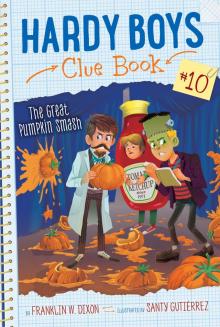 The Great Pumpkin Smash
The Great Pumpkin Smash Who Let the Frogs Out?
Who Let the Frogs Out?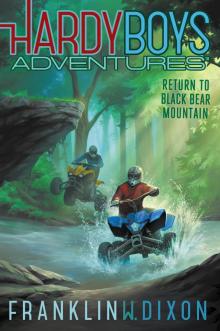 Return to Black Bear Mountain
Return to Black Bear Mountain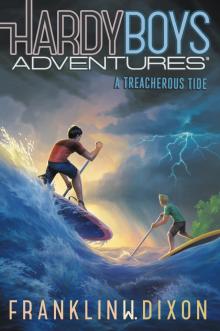 A Treacherous Tide
A Treacherous Tide Bug-Napped
Bug-Napped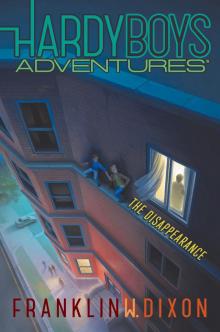 The Disappearance
The Disappearance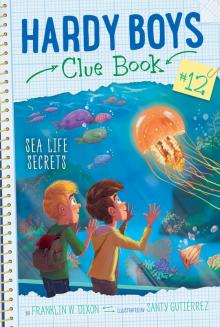 Sea Life Secrets
Sea Life Secrets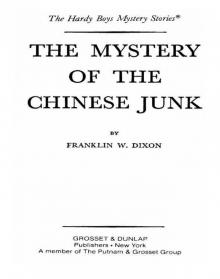 The Mystery of the Chinese Junk
The Mystery of the Chinese Junk A Skateboard Cat-astrophe
A Skateboard Cat-astrophe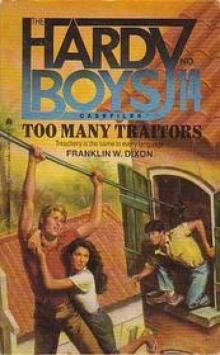 Too Many Traitors
Too Many Traitors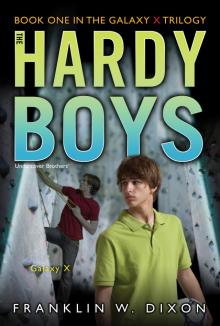 Galaxy X
Galaxy X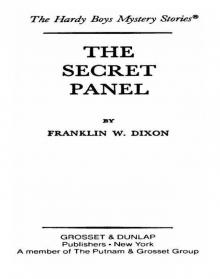 The Secret Panel
The Secret Panel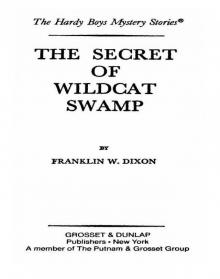 The Secret of Wildcat Swamp
The Secret of Wildcat Swamp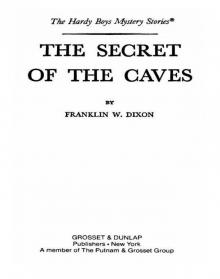 The Secret of the Caves
The Secret of the Caves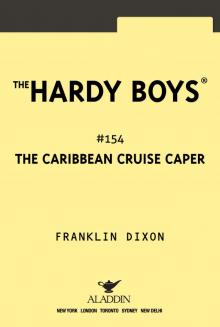 The Caribbean Cruise Caper
The Caribbean Cruise Caper Without a Trace
Without a Trace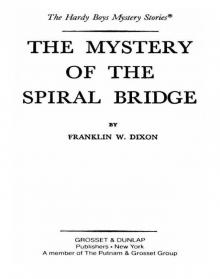 The Mystery of the Spiral Bridge
The Mystery of the Spiral Bridge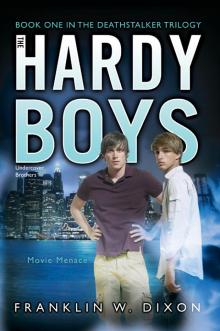 Movie Menace
Movie Menace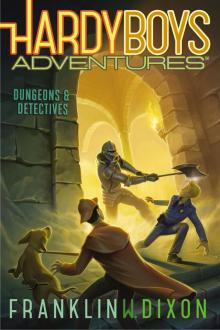 Dungeons & Detectives
Dungeons & Detectives Water-Ski Wipeout
Water-Ski Wipeout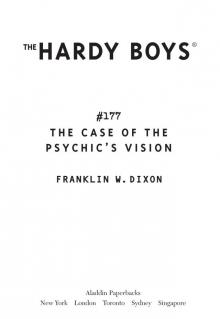 The Case of the Psychic's Vision
The Case of the Psychic's Vision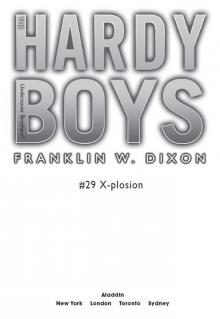 X-plosion
X-plosion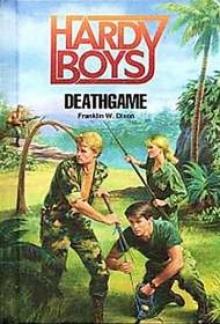 Deathgame
Deathgame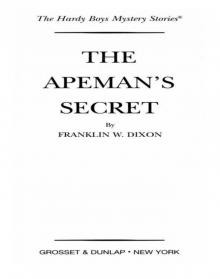 The Apeman's Secret
The Apeman's Secret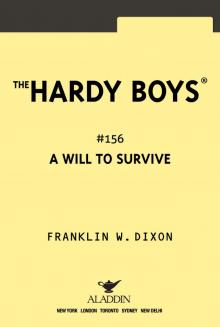 A Will to Survive
A Will to Survive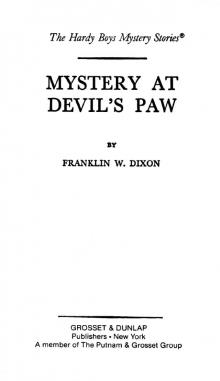 Mystery at Devil's Paw
Mystery at Devil's Paw Blood Money
Blood Money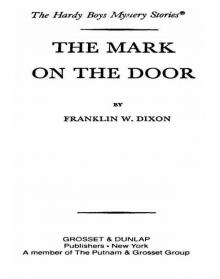 The Mark on the Door
The Mark on the Door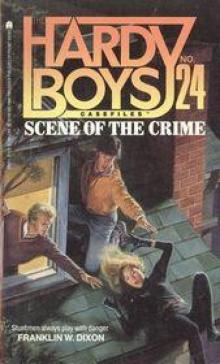 Scene of the Crime
Scene of the Crime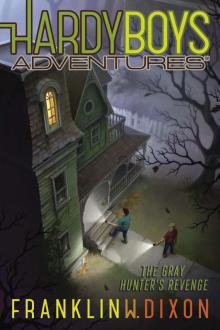 The Gray Hunter's Revenge
The Gray Hunter's Revenge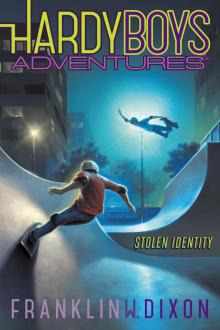 Stolen Identity
Stolen Identity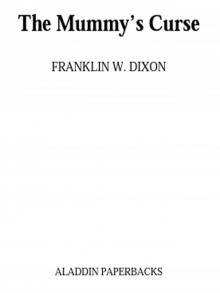 The Mummy's Curse
The Mummy's Curse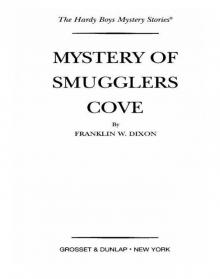 Mystery of Smugglers Cove
Mystery of Smugglers Cove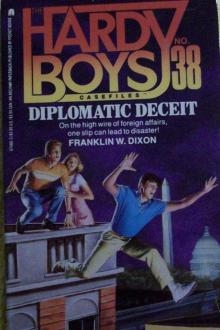 Diplomatic Deceit
Diplomatic Deceit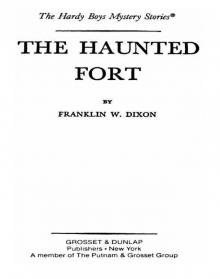 The Haunted Fort
The Haunted Fort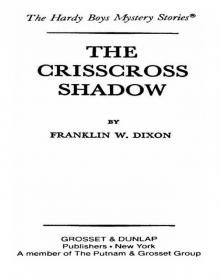 The Crisscross Shadow
The Crisscross Shadow Secret of the Red Arrow
Secret of the Red Arrow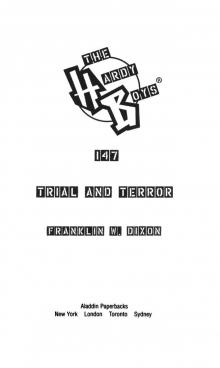 Trial and Terror
Trial and Terror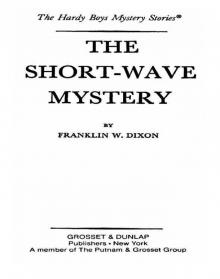 The Short-Wave Mystery
The Short-Wave Mystery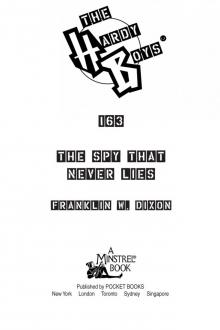 The Spy That Never Lies
The Spy That Never Lies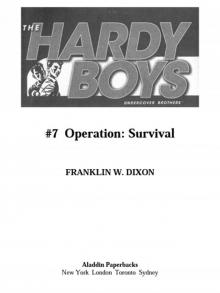 Operation: Survival
Operation: Survival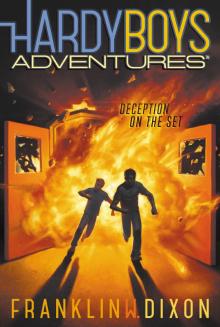 Deception on the Set
Deception on the Set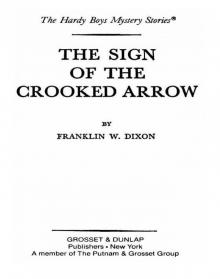 The Sign of the Crooked Arrow
The Sign of the Crooked Arrow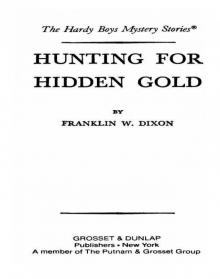 Hunting for Hidden Gold
Hunting for Hidden Gold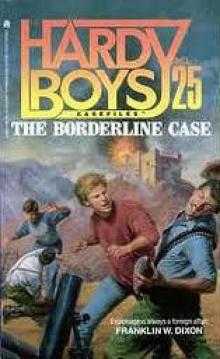 Disaster for Hire
Disaster for Hire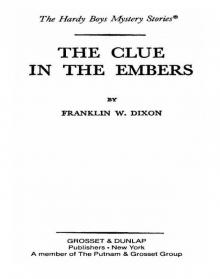 The Clue in the Embers
The Clue in the Embers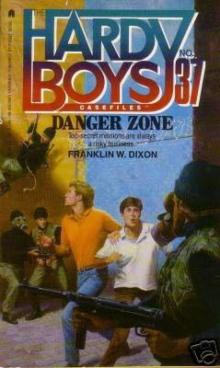 Danger Zone
Danger Zone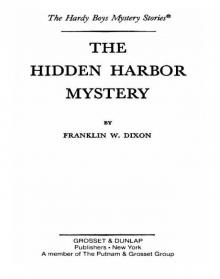 The Hidden Harbor Mystery
The Hidden Harbor Mystery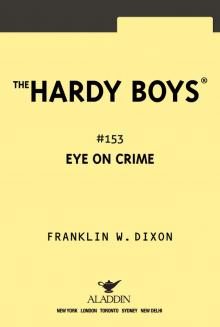 Eye on Crime
Eye on Crime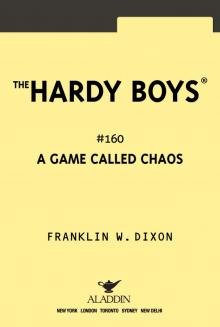 A Game Called Chaos
A Game Called Chaos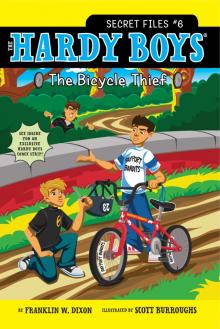 The Bicycle Thief
The Bicycle Thief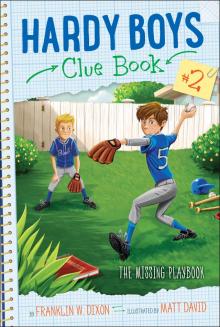 The Missing Playbook
The Missing Playbook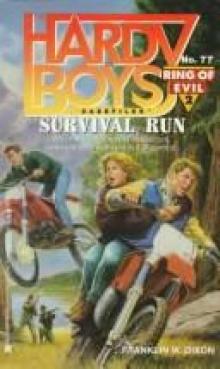 Survival Run
Survival Run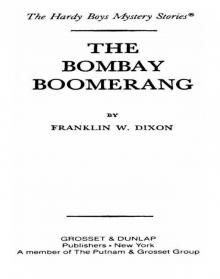 The Bombay Boomerang
The Bombay Boomerang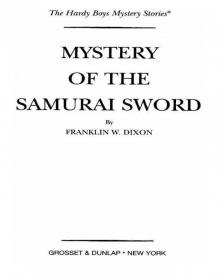 Mystery of the Samurai Sword
Mystery of the Samurai Sword Burned
Burned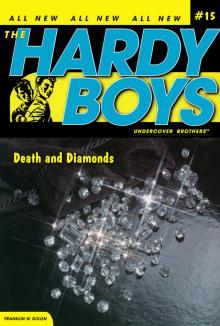 Death and Diamonds
Death and Diamonds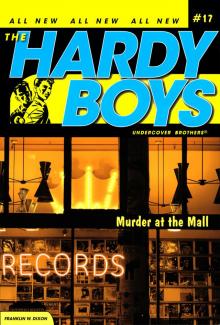 Murder at the Mall
Murder at the Mall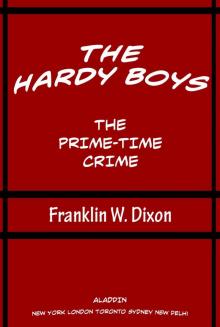 The Prime-Time Crime
The Prime-Time Crime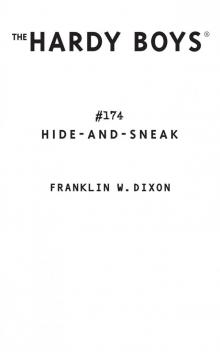 Hide-and-Sneak
Hide-and-Sneak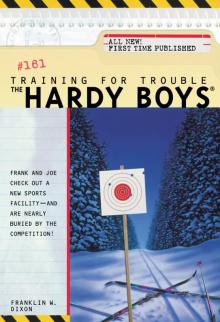 Training for Trouble
Training for Trouble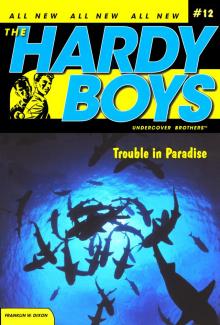 Trouble in Paradise
Trouble in Paradise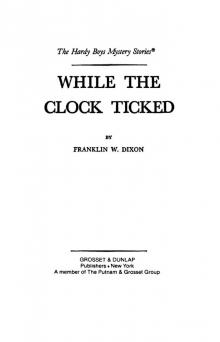 While the Clock Ticked
While the Clock Ticked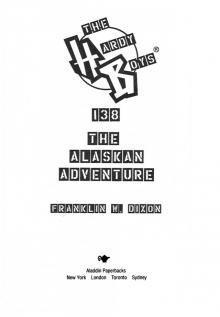 The Alaskan Adventure
The Alaskan Adventure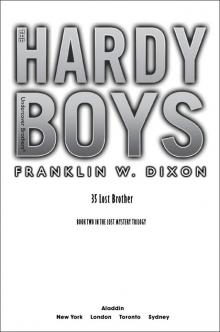 The Lost Brother
The Lost Brother Tunnel of Secrets
Tunnel of Secrets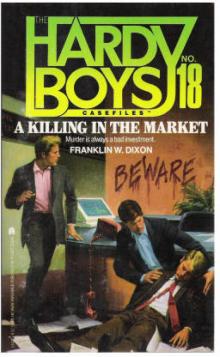 A Killing in the Market
A Killing in the Market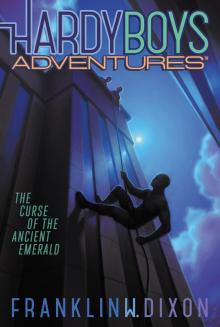 The Curse of the Ancient Emerald
The Curse of the Ancient Emerald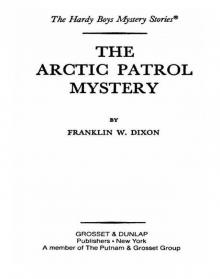 The Arctic Patrol Mystery
The Arctic Patrol Mystery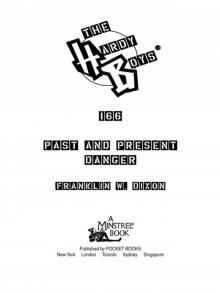 Past and Present Danger
Past and Present Danger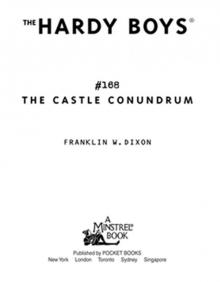 The Castle Conundrum (Hardy Boys)
The Castle Conundrum (Hardy Boys)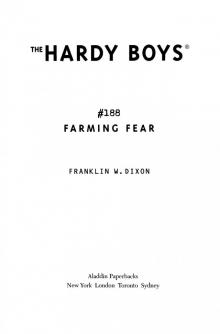 Farming Fear
Farming Fear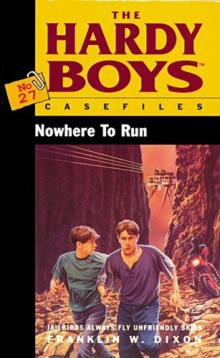 Nowhere to Run
Nowhere to Run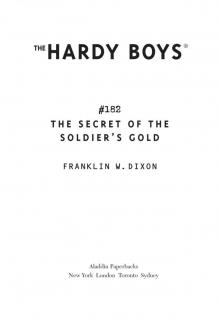 The Secret of the Soldier's Gold
The Secret of the Soldier's Gold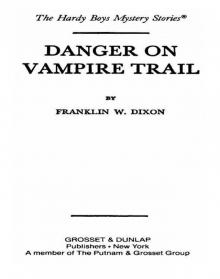 Danger on Vampire Trail
Danger on Vampire Trail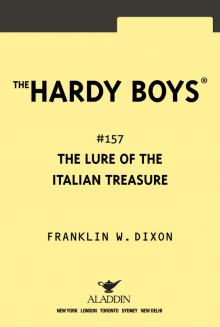 The Lure of the Italian Treasure
The Lure of the Italian Treasure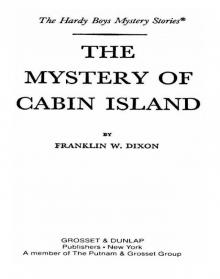 The Mystery of Cabin Island
The Mystery of Cabin Island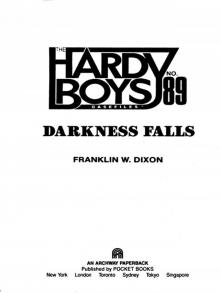 Darkness Falls
Darkness Falls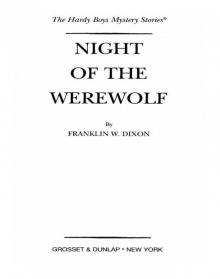 Night of the Werewolf
Night of the Werewolf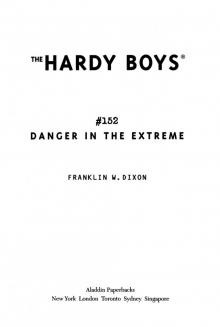 Danger in the Extreme
Danger in the Extreme The Lazarus Plot
The Lazarus Plot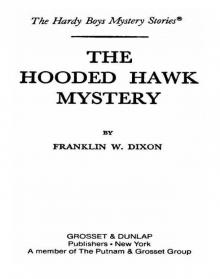 The Hooded Hawk Mystery
The Hooded Hawk Mystery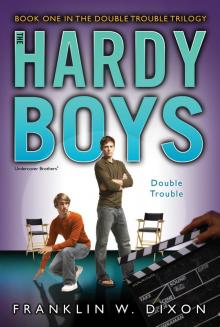 Double Trouble
Double Trouble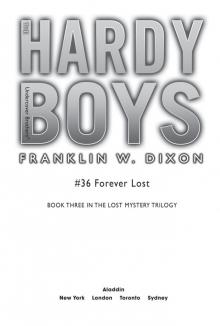 Forever Lost
Forever Lost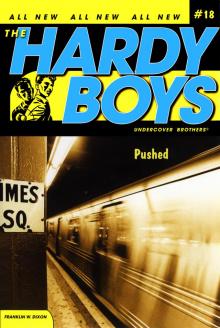 Pushed
Pushed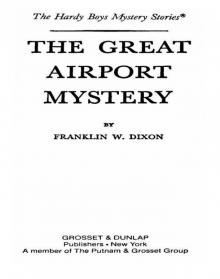 The Great Airport Mystery
The Great Airport Mystery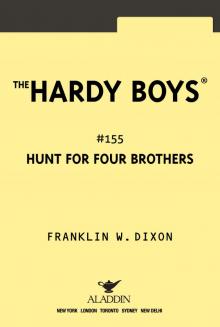 The Hunt for Four Brothers
The Hunt for Four Brothers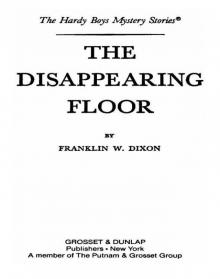 The Disappearing Floor
The Disappearing Floor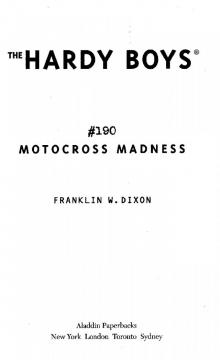 Motocross Madness
Motocross Madness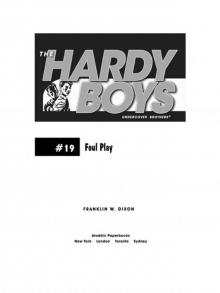 Foul Play
Foul Play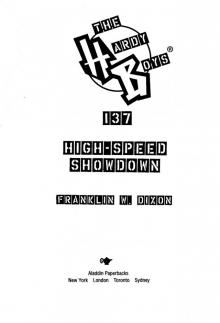 High-Speed Showdown
High-Speed Showdown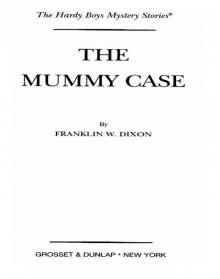 The Mummy Case
The Mummy Case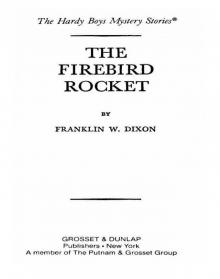 The Firebird Rocket
The Firebird Rocket Trouble in Warp Space
Trouble in Warp Space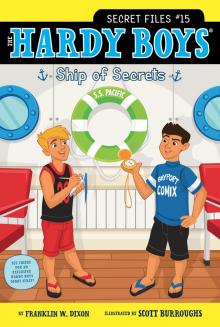 Ship of Secrets
Ship of Secrets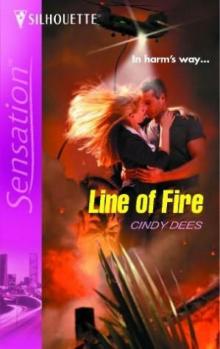 Line of Fire
Line of Fire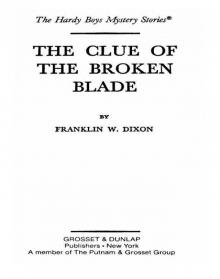 The Clue of the Broken Blade
The Clue of the Broken Blade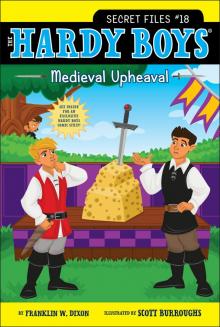 Medieval Upheaval
Medieval Upheaval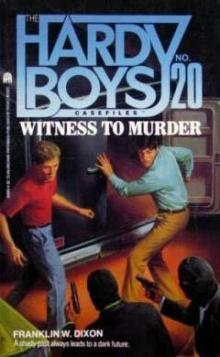 Witness to Murder
Witness to Murder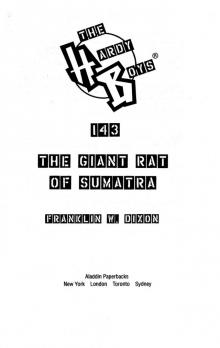 The Giant Rat of Sumatra
The Giant Rat of Sumatra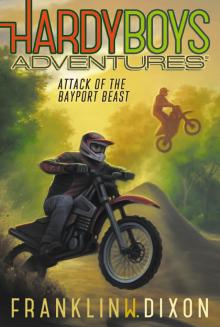 Attack of the Bayport Beast
Attack of the Bayport Beast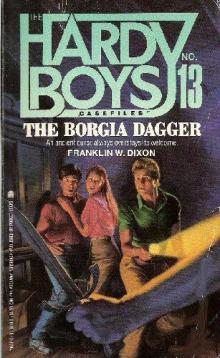 The Borgia Dagger
The Borgia Dagger Scavenger Hunt Heist
Scavenger Hunt Heist No Way Out
No Way Out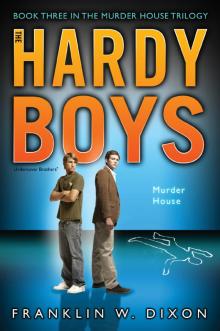 Murder House
Murder House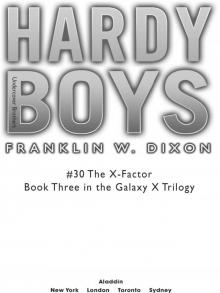 The X-Factor
The X-Factor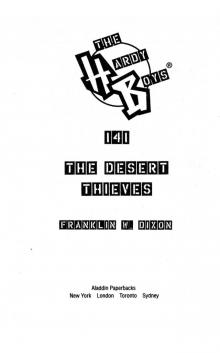 The Desert Thieves
The Desert Thieves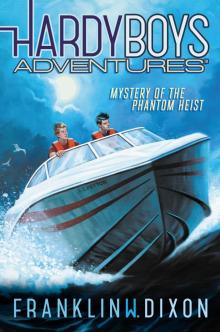 Mystery of the Phantom Heist
Mystery of the Phantom Heist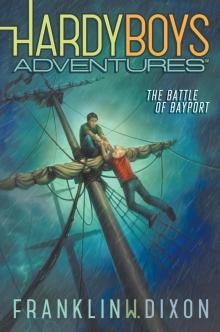 The Battle of Bayport
The Battle of Bayport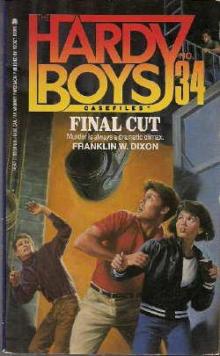 Final Cut
Final Cut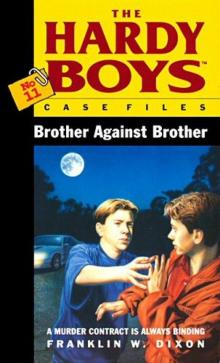 Brother Against Brother
Brother Against Brother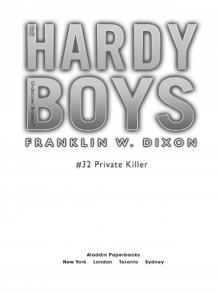 Private Killer
Private Killer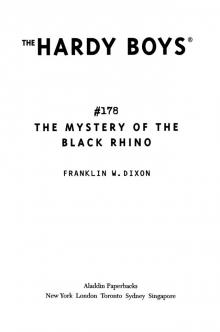 The Mystery of the Black Rhino
The Mystery of the Black Rhino Feeding Frenzy
Feeding Frenzy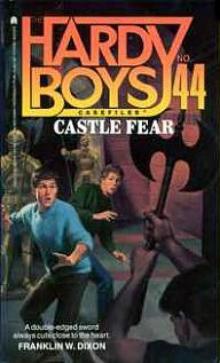 Castle Fear
Castle Fear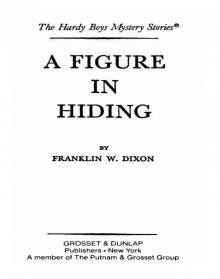 A Figure in Hiding
A Figure in Hiding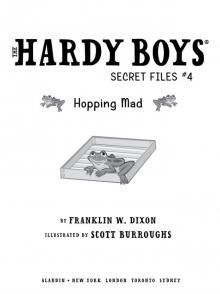 Hopping Mad
Hopping Mad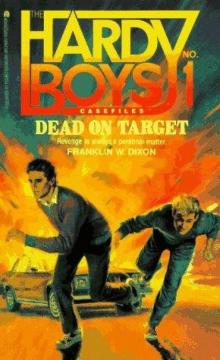 Dead on Target
Dead on Target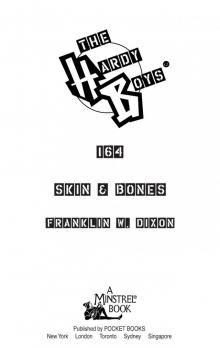 Skin and Bones
Skin and Bones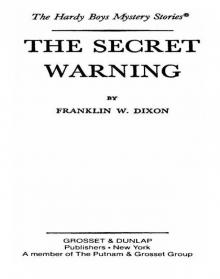 The Secret Warning
The Secret Warning Flesh and Blood
Flesh and Blood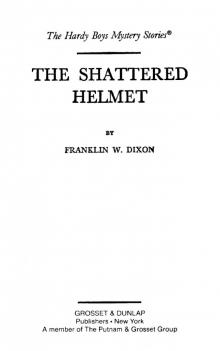 The Shattered Helmet
The Shattered Helmet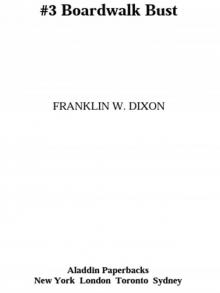 Boardwalk Bust
Boardwalk Bust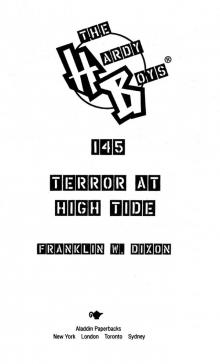 Terror at High Tide
Terror at High Tide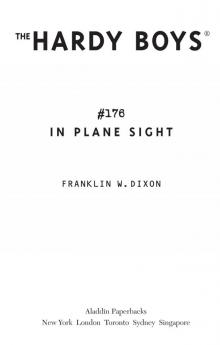 In Plane Sight
In Plane Sight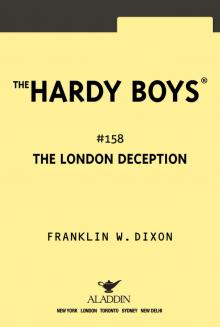 The London Deception
The London Deception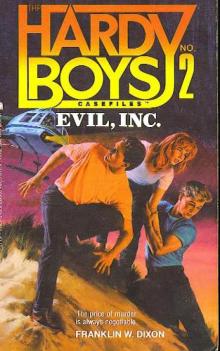 Evil, Inc.
Evil, Inc.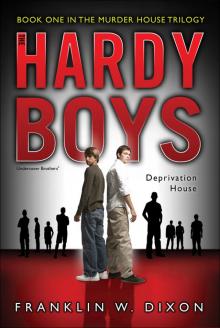 Deprivation House
Deprivation House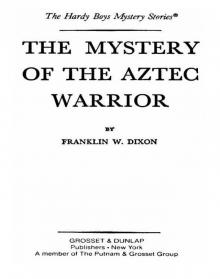 The Mystery of the Aztec Warrior
The Mystery of the Aztec Warrior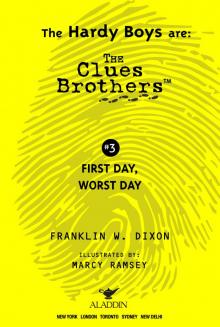 First Day, Worst Day
First Day, Worst Day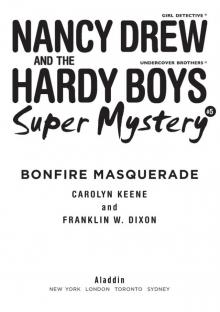 Bonfire Masquerade
Bonfire Masquerade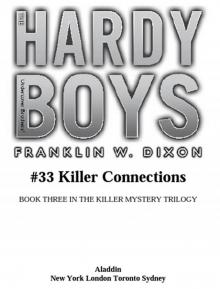 Killer Connections
Killer Connections Strategic Moves
Strategic Moves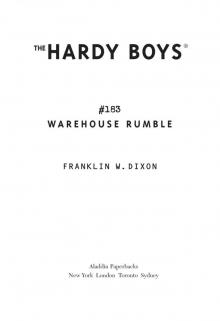 Warehouse Rumble
Warehouse Rumble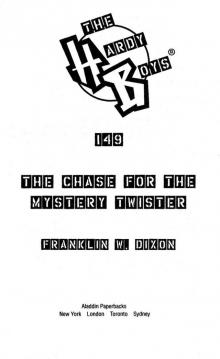 The Chase for the Mystery Twister
The Chase for the Mystery Twister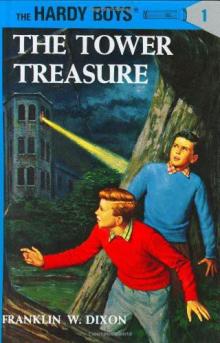 The Tower Treasure thb-1
The Tower Treasure thb-1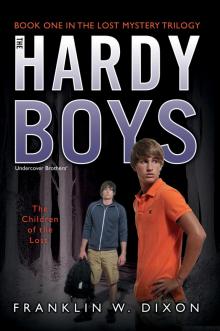 The Children of the Lost
The Children of the Lost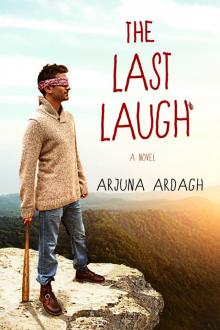 The Last Laugh
The Last Laugh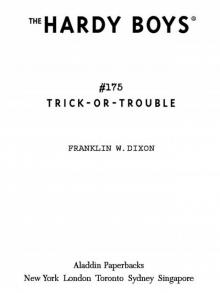 Trick-or-Trouble
Trick-or-Trouble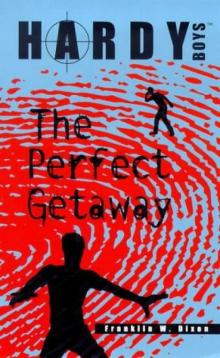 Perfect Getaway
Perfect Getaway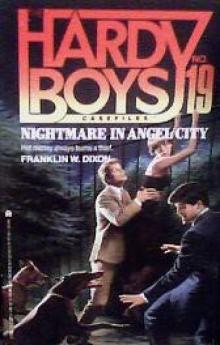 Nightmare in Angel City
Nightmare in Angel City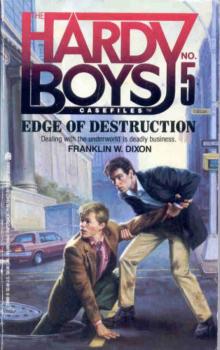 Edge of Destruction
Edge of Destruction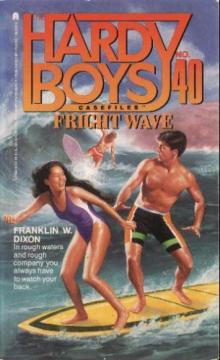 Fright Wave
Fright Wave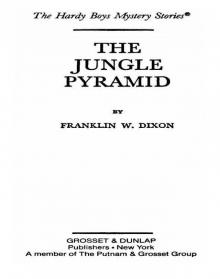 The Jungle Pyramid
The Jungle Pyramid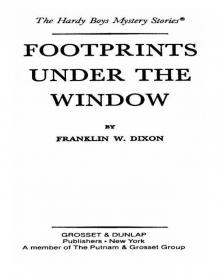 Footprints Under the Window
Footprints Under the Window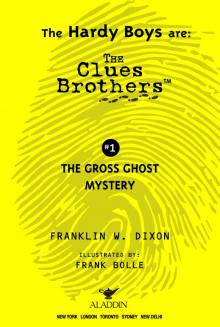 The Gross Ghost Mystery
The Gross Ghost Mystery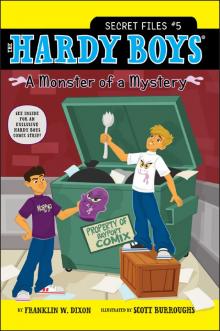 A Monster of a Mystery
A Monster of a Mystery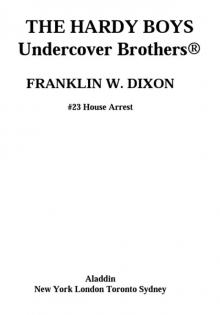 House Arrest
House Arrest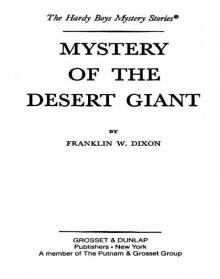 Mystery of the Desert Giant
Mystery of the Desert Giant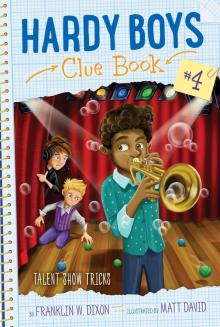 Talent Show Tricks
Talent Show Tricks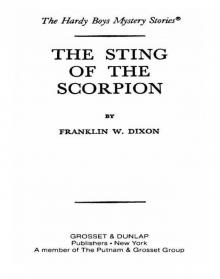 The Sting of the Scorpion
The Sting of the Scorpion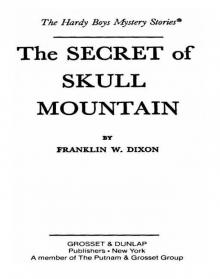 The Secret of Skull Mountain
The Secret of Skull Mountain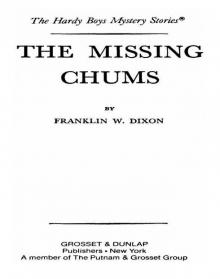 The Missing Chums
The Missing Chums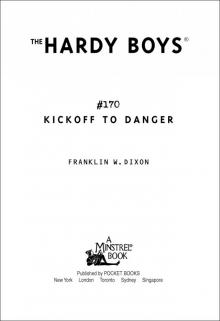 Kickoff to Danger
Kickoff to Danger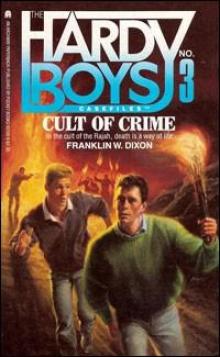 Cult of Crime
Cult of Crime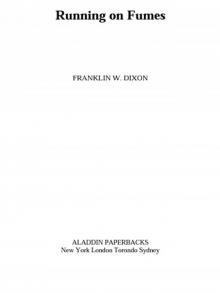 Running on Fumes
Running on Fumes Martial Law
Martial Law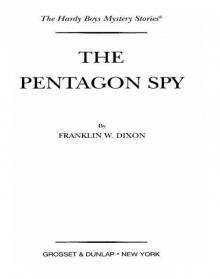 The Pentagon Spy
The Pentagon Spy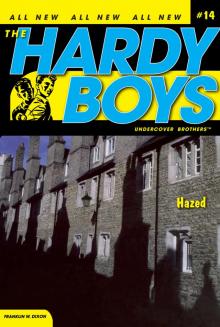 Hazed
Hazed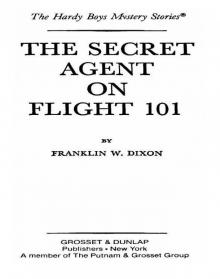 The Secret Agent on Flight 101
The Secret Agent on Flight 101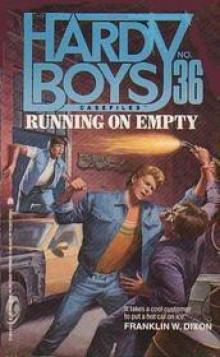 Running on Empty
Running on Empty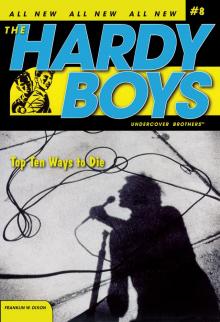 Top Ten Ways to Die
Top Ten Ways to Die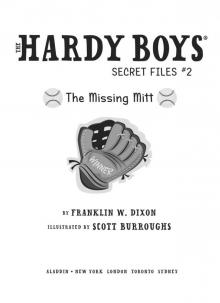 The Missing Mitt
The Missing Mitt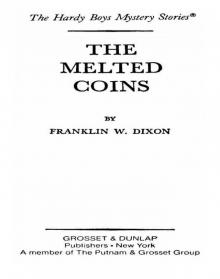 The Melted Coins
The Melted Coins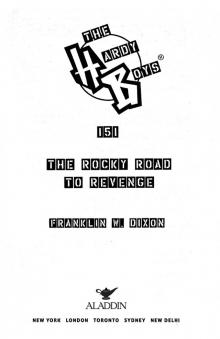 The Rocky Road to Revenge
The Rocky Road to Revenge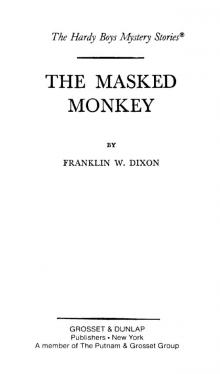 The Masked Monkey
The Masked Monkey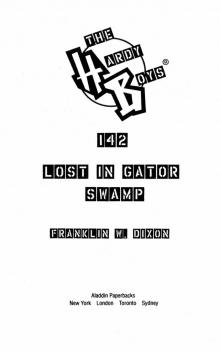 Lost in Gator Swamp
Lost in Gator Swamp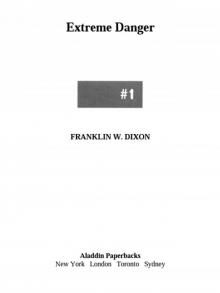 Extreme Danger
Extreme Danger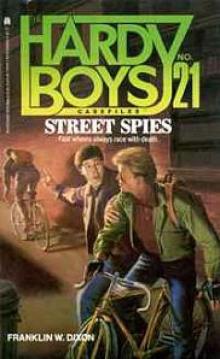 Street Spies
Street Spies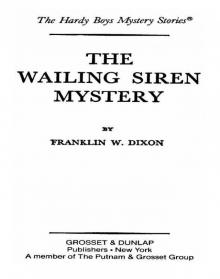 The Wailing Siren Mystery
The Wailing Siren Mystery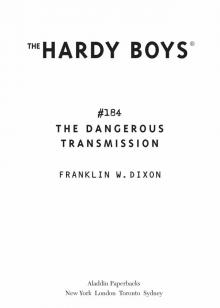 The Dangerous Transmission
The Dangerous Transmission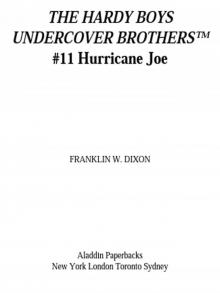 Hurricane Joe
Hurricane Joe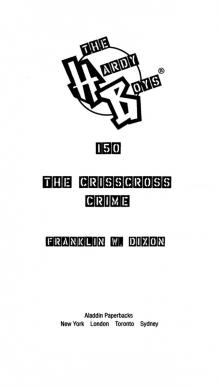 The Crisscross Crime
The Crisscross Crime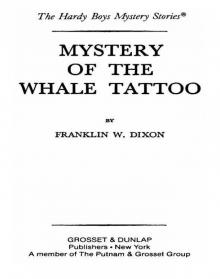 Mystery of the Whale Tattoo
Mystery of the Whale Tattoo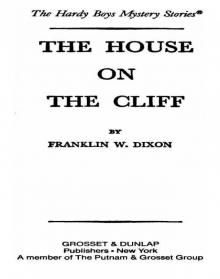 The House on the Cliff
The House on the Cliff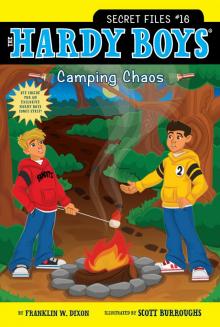 Camping Chaos
Camping Chaos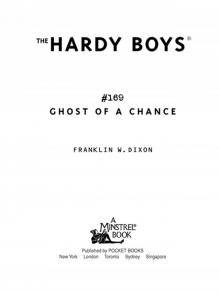 Ghost of a Chance
Ghost of a Chance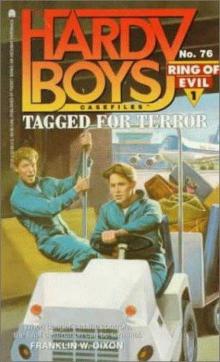 Tagged for Terror
Tagged for Terror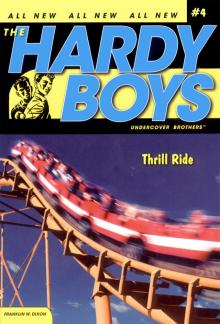 Thrill Ride
Thrill Ride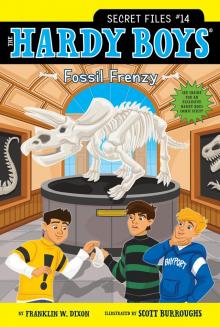 Fossil Frenzy
Fossil Frenzy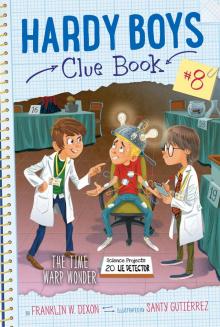 The Time Warp Wonder
The Time Warp Wonder Ghost Stories
Ghost Stories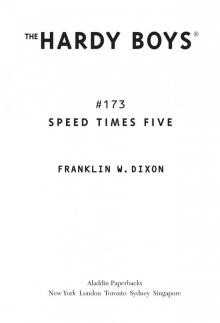 Speed Times Five
Speed Times Five What Happened at Midnight
What Happened at Midnight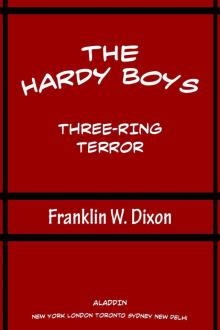 Three-Ring Terror
Three-Ring Terror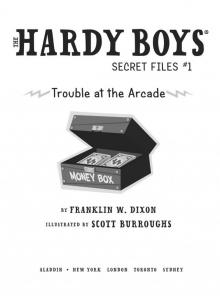 Trouble at the Arcade
Trouble at the Arcade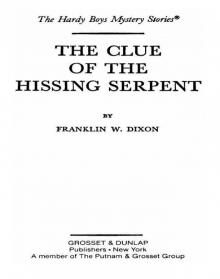 The Clue of the Hissing Serpent
The Clue of the Hissing Serpent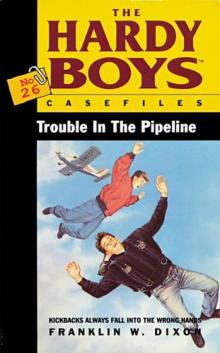 Trouble in the Pipeline
Trouble in the Pipeline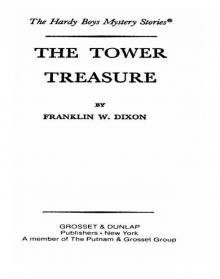 The Tower Treasure
The Tower Treasure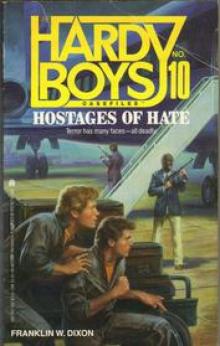 Hostages of Hate
Hostages of Hate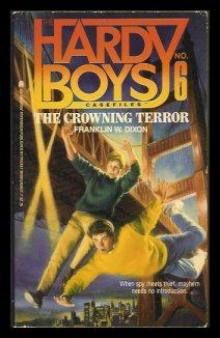 The Crowning Terror
The Crowning Terror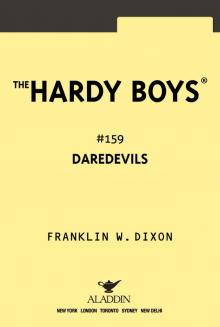 Daredevils
Daredevils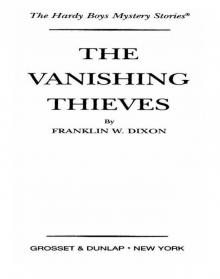 The Vanishing Thieves
The Vanishing Thieves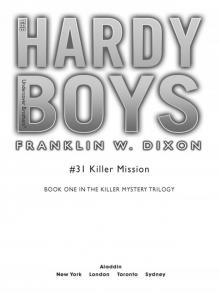 Killer Mission
Killer Mission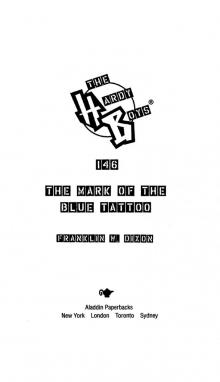 The Mark of the Blue Tattoo
The Mark of the Blue Tattoo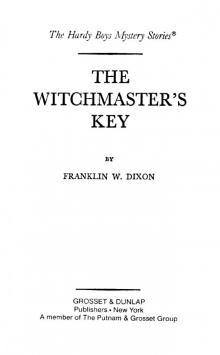 The Witchmaster's Key
The Witchmaster's Key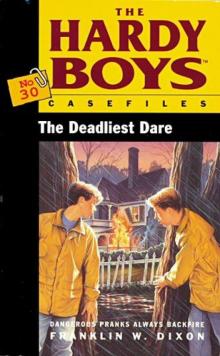 The Deadliest Dare
The Deadliest Dare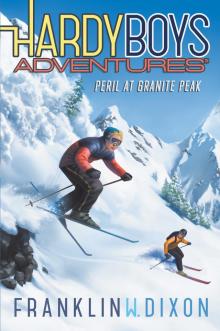 Peril at Granite Peak
Peril at Granite Peak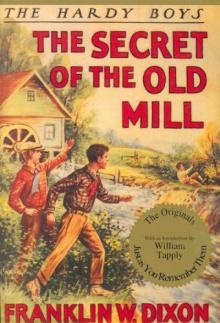 The Secret Of The Old Mill thb-3
The Secret Of The Old Mill thb-3 Rocky Road
Rocky Road The Demolition Mission
The Demolition Mission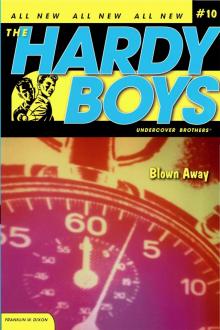 Blown Away
Blown Away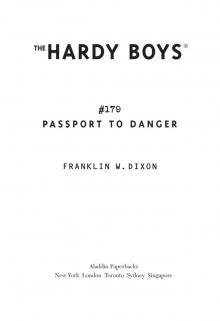 Passport to Danger
Passport to Danger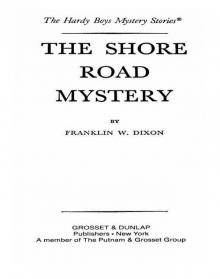 The Shore Road Mystery
The Shore Road Mystery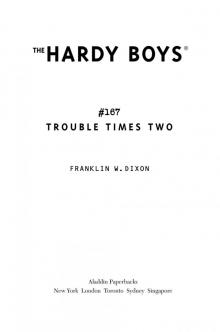 Trouble Times Two
Trouble Times Two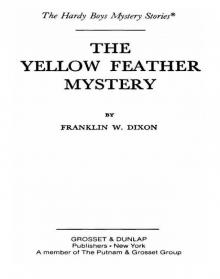 The Yellow Feather Mystery
The Yellow Feather Mystery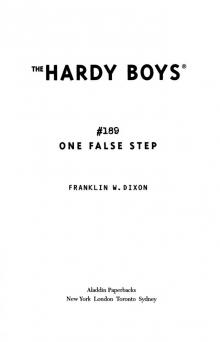 One False Step
One False Step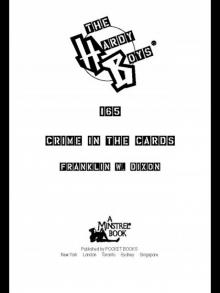 Crime in the Cards
Crime in the Cards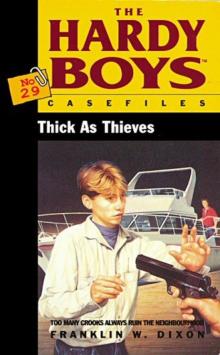 Thick as Thieves
Thick as Thieves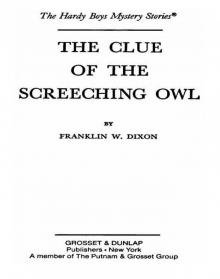 The Clue of the Screeching Owl
The Clue of the Screeching Owl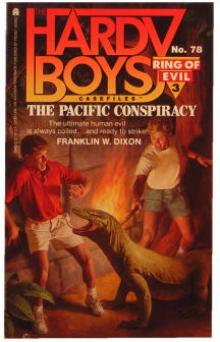 The Pacific Conspiracy
The Pacific Conspiracy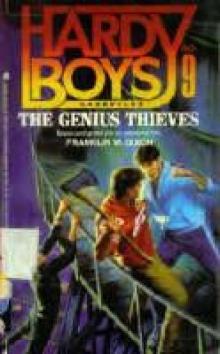 The Genius Thieves
The Genius Thieves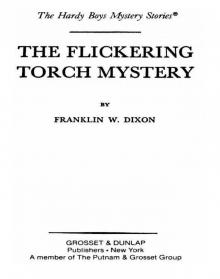 The Flickering Torch Mystery
The Flickering Torch Mystery Into Thin Air
Into Thin Air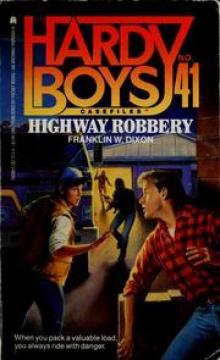 Highway Robbery
Highway Robbery Deadfall
Deadfall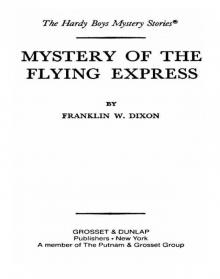 Mystery of the Flying Express
Mystery of the Flying Express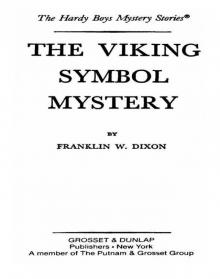 The Viking Symbol Mystery
The Viking Symbol Mystery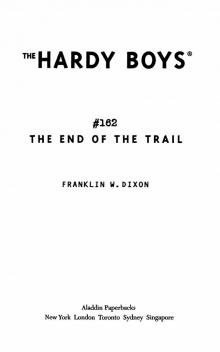 The End of the Trail
The End of the Trail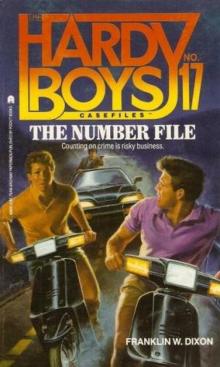 The Number File
The Number File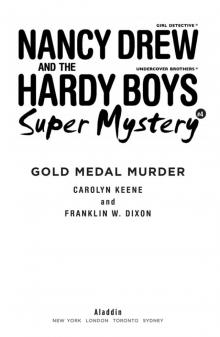 Gold Medal Murder
Gold Medal Murder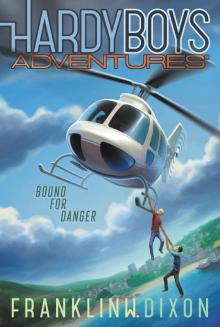 Bound for Danger
Bound for Danger Collision Course
Collision Course The Madman of Black Bear Mountain
The Madman of Black Bear Mountain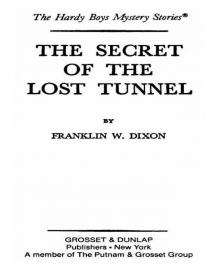 The Secret of the Lost Tunnel
The Secret of the Lost Tunnel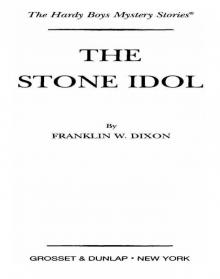 The Stone Idol
The Stone Idol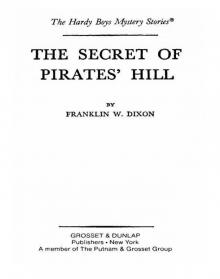 The Secret of Pirates' Hill
The Secret of Pirates' Hill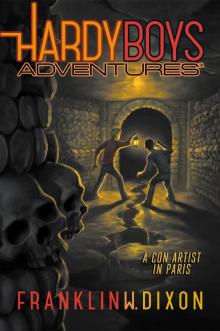 A Con Artist in Paris
A Con Artist in Paris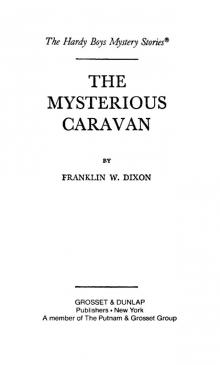 The Mysterious Caravan
The Mysterious Caravan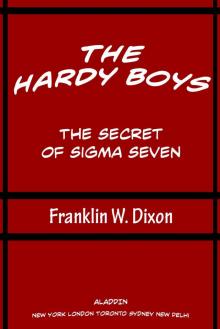 The Secret of Sigma Seven
The Secret of Sigma Seven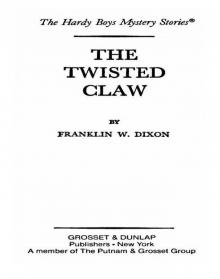 The Twisted Claw
The Twisted Claw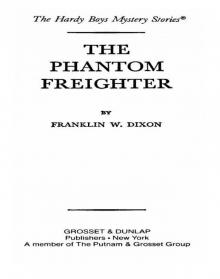 The Phantom Freighter
The Phantom Freighter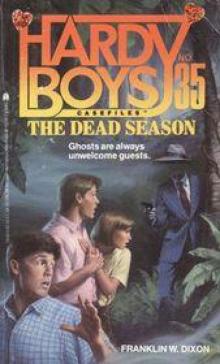 The Dead Season
The Dead Season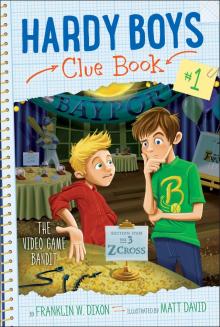 The Video Game Bandit
The Video Game Bandit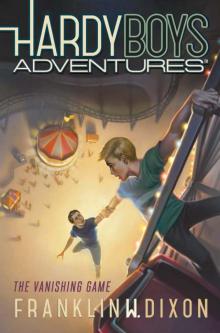 The Vanishing Game
The Vanishing Game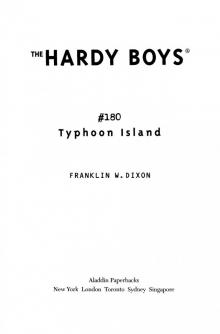 Typhoon Island
Typhoon Island